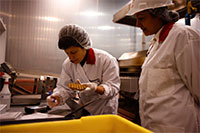FDA Promoting International Capacity Building Plan
By Sara Zborovski, LLB
Earlier this year, the FDA issued its international food safety capacity building plan (the “Plan”), as required by section 305 of the Food Safety Modernization Act (“FSMA”). Section 305 of the FSMA requires FDA to develop “a comprehensive plan to expand the technical, scientific, and regulatory food safety capacity of foreign governments and their respective food industries, from which foods are exported to the United States.”
 As has been widely discussed, the FSMA changes the focus of the U.S. food safety regime from reaction to prevention. In part, the FSMA does this by giving greater powers to the FDA to oversee the food products that are exported to the U.S. each year. There is now an expectation that imported foods be held to the same standards as US-made foods to make them safer for U.S. consumers.
As has been widely discussed, the FSMA changes the focus of the U.S. food safety regime from reaction to prevention. In part, the FSMA does this by giving greater powers to the FDA to oversee the food products that are exported to the U.S. each year. There is now an expectation that imported foods be held to the same standards as US-made foods to make them safer for U.S. consumers.
Traditionally, the primary tool used by FDA to monitor the safety of imported foods has been inspections at ports of entry. However, there is now a general recognition that the FDA must extend its reach beyond U.S. borders and deeper into the supply chain. As set out in the Plan, this will be accomplished (at least in part) through FDA coordination with its overseas regulatory counterparts, industry and other organizations.
The Capacity Building Plan represents a framework to guide the FDA’s efforts over the next five years. In a nutshell, it outlines how the FDA will prioritize its capacity building (based on risk), and how it will work with foreign agencies and others. The Plan can be found here. It doesn’t impose any obligations on industry, but rather gives some insight into the FDA’s thinking about its role in the global food market.
The Plan outlines four key goals and objectives:
- Ensure efficiency across the FDA Foods and Veterinary Medicine Program: the FDA proposes to accomplish this goal through consultation, coordination and integrated planning across agency working groups involved in the implementation of the FSMA.
- Increase effectiveness through evidence-based decision making: the FDA will seek to obtain information about risks that are specific to individual countries and foods to inform risk-based decision making and capacity building programs. According to the Plan, FDA is building a risk-based decision making tool that will incorporate country-specific data to guide the agency to the specific facility, food products, processes, and hazards that warrant inspection. With increased information, FDA can target its enforcement activities and capacity building programs as appropriate.
- Support the exchange of information between FDA and other foreign government agencies or other entities, including establishing mechanisms to support secure electronic data sharing with foreign governments.
- Enhance technical assistance and capacity-building in food, including coordination with other agencies and developing training materials focused on global food safety best practices.
In addition to executing the Plan, the FDA announced that it has expanded its global presence by establishing new offices in China, India, Latin America, Europe, Sub-Saharan Africa, the Middle East and the Asia-Pacific.
We may see a more specific, detailed framework for implementation of the capacity building plan in the months and years to come. In the meantime, it gives a pretty good idea of the agency’s thinking and holds out hope for an increasingly safe global food supply chain.
About the Author
Sara Zborovski is a partner at Gilbert’s LLP. She acts as legal counsel to the industries regulated by Health Canada, including the food and beverage industries. She assists companies in navigating the regulatory landscape imposed by the Food and Drugs Act and its related regulations, and advocates before all branches of Health Canada. Sara has a particular interest in food safety and advises clients on preparing and implementing compliance policies and programs. Sara works with clients to get products from idea to market and beyond, providing strategic advice on approvals, marketing strategies and compliance. www.thefoodlawyer.ca
To have more articles like this emailed to your inbox, become a GFSR Member today!

-
 FeaturedRisk management
The Cost of a Breach: What a Cyberattack Could Mean for Food Safety Recalls
FeaturedRisk management
The Cost of a Breach: What a Cyberattack Could Mean for Food Safety Recalls
-
 FeaturedRisk management
Securing the Food Chain: How ISO/IEC 27001 Strengthens Cybersecurity
FeaturedRisk management
Securing the Food Chain: How ISO/IEC 27001 Strengthens Cybersecurity
-
 FeaturedRisk management
Revolutionizing Food Safety Training: Breaking Out of the “Check-the-Box” Mentality
FeaturedRisk management
Revolutionizing Food Safety Training: Breaking Out of the “Check-the-Box” Mentality
-
 GFSI Standards
GFSI 2025: Building Trust, Tech-Forward Solutions, and Global Unity in Food Safety
GFSI Standards
GFSI 2025: Building Trust, Tech-Forward Solutions, and Global Unity in Food Safety
-
 FeaturedFood Safety
Integrated Pest Management: Strategies to Protect Your Brand’s Reputation
FeaturedFood Safety
Integrated Pest Management: Strategies to Protect Your Brand’s Reputation
-
 FeaturedFood Safety Culture & Training
No Open Door Policy: Challenges That Impact Pest Control in Food Processing Plants
FeaturedFood Safety Culture & Training
No Open Door Policy: Challenges That Impact Pest Control in Food Processing Plants



